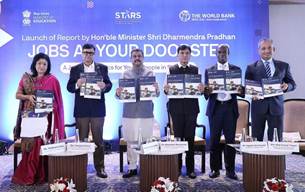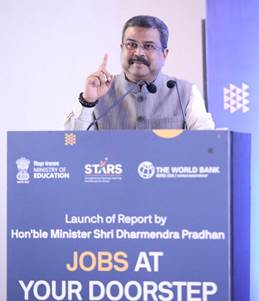Shri Dharmendra Pradhan and Dr. Mansukh Mandaviya launch ‘Jobs at Your Doorstep’ Report by World Bank
Shri Dharmendra Pradhan and Dr. Mansukh Mandaviya launch ‘Jobs at Your Doorstep’ Report by World Bank
Union Minister for Education, Shri Dharmendra Pradhan, along with Minister of Labour and Employment and Youth Affairs and Sports Dr. Mansukh Mandaviya launched a report titled Jobs at Your Doorstep: A Jobs Diagnostics for Young People in Six States, at an event in New Delhi today. Secretary, Department of School Education & Literacy, Shri Sanjay Kumar; Secretary, Ministry of Skill Development and Entrepreneurship, Shri Atul Kumar Tiwari; Country Director, World Bank, India, Mr. Auguste Tano Kouame; Lead Education Specialist, Smt. Shabnam Sinha, World Bank, India, officials of the Ministries and some school Principals were also present at the event.


While speaking at the event Shri Dharmendra Pradhan complimented the World Bank team for the detailed report on six states. He also suggested the World Bank team adopt a pan-India framework. Such in-depth diagnostics on skilling and jobs will enable stakeholders to create new architectures and make progressive policies for empowering our population, he said. He highlighted the need to broaden the definition of jobs and employment. Shri Pradhan said the framework has to be broadened and viewed from the perspective of economic opportunities and empowerment.
Expressing his gratitude to Prime Minister Shri Narendra Modi’s vision to transform India into a global skills hub, the Minister said that the population of the country will be the driver of the global economy. For this, skilling needs to begin right at schools and NEP 2020 has envisioned mainstreaming skilling in schools, he said.
Shri Pradhan also said that technological disruptions will change the nature of jobs and economic activities and it is needed to continuously up-skill and re-skill the workforce for future-proofing them. A ‘whole-of-a-government’ approach and working collaboratively to skill, up-skill and re-skill our large population is needed to emerge as the skill capital of the world, he mentioned.
Dr. Mansukh Mandaviya, in his address, mentioned that in the last budget, it was proposed to develop a curriculum to harness the potential of region-specific skills and employment, following a hub-and-spoke model. He also stressed on correcting the definition of job beyond employment. It is important to include informal education in academic education, he added. He expressed his gratitude to Prime Minister Shri Narendra Modi for his commitment to building a Viksit Bharat, which is leading the country to become a global hub of skilled talent.
Shri Sanjay Kumar reaffirmed Prime Minister Shri Narendra Modi’s vision of a ‘whole-of-government’ approach, which has inspired collaboration between the two Ministries to develop systems in schools for inculcating the culture of skill education. Emphasizing the significance of practising a skill to achieve mastery, he noted that the NEP 2020 recommends instilling diligence and consistent practice in students.
The Government of India has an ambitious plan to transform the economy towards a high-income country status by 2047. To achieve the goal of India becoming a productive economy, she needs to urgently address challenges facing its employment landscape and prepare its workforce. Multifaceted, dynamic, convergent approaches aligned to educational reform and market-linked skill development (SD) will help India reach its job growth potential. Key reforms by Government of India will help strengthen the vocational education sector to become a decentralized, local market-led, inclusive and fiscally sustainable sector, to train the workforce for the skills required for a high-income India.
The Ministry of Education has made major strides on this front by launching the National Education Policy (NEP) 2020 and the National Curriculum Framework (NCF) 2023. Both policies emphasize the importance of skilling in schools, with the NEP setting ambitious targets of 50 per cent of students accessing skill education by 2025 and all secondary schools offering skill education by 2030. As India sets out to achieve these targets, the “Jobs at Your Doorstep” report serves as both a diagnostic and roadmap to providing strategic linkages and convergence between education and the jobs agenda of India. It goes deep into the job landscape of six states: Himachal Pradesh, Kerala, Madhya Pradesh, Maharashtra, Odisha, and Rajasthan, and identifies key priority sectors and roles that offer the highest employment potential for young people graduating from secondary school.
The World Bank assists the Ministry of Education with its program called Strengthening Teaching-Learning and Results for States (STARS) covering six states namely Himachal Pradesh, Kerala, Madhya Pradesh, Maharashtra, Odisha, and Rajasthan (collectively the STARS states). STARS Scheme has a national component under which key reforms are shared and disseminated for implementation. This report underscores the significant benefits of embedding skill-based education from grades 9-12 to prepare students for diverse career paths relying on a bottom-up approach, going deep in districts of the six states. These present varying socio-economic profiles offer a nuanced view of how industry and government can both contribute towards the jobs agenda.
Jobs at Your Doorstep is a skills gap analysis that attempts to align trades offered in schools industry-specific needs of the districts where the schools are present. The study was initiated to reimagine the skill education offering through in-depth primary as well as secondary research in six STARS states.